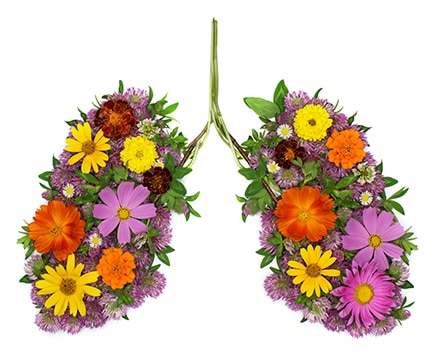With one major task, helping us breathe, lungs play an essential role in our overall health and wellbeing. Unfortunately, there are multiple factors that impact lung health—these organs must contend with pollution, smoke and germs.
Over time these factors can compound, taking a toll on your lungs and putting you at a higher risk of developing lung disease. With a multitude of lung conditions, one of the most serious being lung cancer, it’s important for each of us to learn more about promoting lung health.
While we know what may be harmful to lung health, what about tips that are beneficial? They do exist, and the good news is there are easy ways for each of us to start practicing better lung health.
1. Don’t smoke…and if you do, stop
Smoking increases the risk of developing many serious illnesses, as well as accelerating the aging process. Due to the harmful chemicals found in cigarettes, smoking can cause a host of health issues, including:
•Multiple types of cancer: lung, bladder, cervical and throat, among several others
•Higher blood pressure, which increases your risk of stroke or heart attack
•Reduced blood flow, which can slow healing and cause wrinkles
With more resources than ever to aid in the quitting process, you can utilize support groups, classes, and quit-smoking products to kick this bad habit for good. Even if you think it may be too late to quit, experts agree that no matter when you quit, it will have a positive impact on your health.
The Freshstart Smoking Cessation Program is a free service of Gwinnett Medical Center that provides counseling, education, and support for those interested in quitting smoking. To learn more about this program, visit gwinnettmedicalcenter.org/smokingcessation.
2. Avoid indoor and outdoor air pollutants
Many of us hear about the importance of getting fresh air; however, that may be more difficult than you’d think. With several different sources of air pollution, both indoor and outdoor, it can be difficult to find truly fresh air. Things like carbon monoxide, nitrogen dioxide, sulfur dioxide, and particulate matter are very harmful and are the result of many common pollutants.
By learning more about these common sources of air pollution, you can better avoid them and promote lung health:
•Exhaust from cars, lawnmowers, and buses
•Mold and mildew
•Individuals with infections
•Some household chemicals
•Radon (Gwinnett is among the top four counties in Georgia for highest predicted average indoor radon level)
3. Start doing breathing exercises
Our lungs need exercise just like the other muscles of our body. To keep them functioning as they should, breathing exercises help rid the stale air in your lungs, which increases oxygen levels and strengthens the diaphragm.
Two of the most popular breathing exercises recommended by the American Lung Association are:
•The Pursed Lip Breathing Exercise: Simply breathe in through your nose and breathe out through your mouth with pursed lips. Exhaling should take at least twice as long as inhaling.
•The Belly Breathing Exercise: During this exercise, you will simply breathe in through your nose while paying attention to how your belly fills with air. By placing your hands on your stomach, you can feel your belly rising and falling with each breath. Exhaling should take two to three times as long as inhaling.
4. Get screened
You’ve probably heard about routine screenings for breast health, prostate health, even colon health, but what about lung health? Well, now there is a lung screening exam available that utilizes a low dose CT scan to determine if nodules or masses are present, even if you don’t have symptoms.
Recognized as a Center of Excellence by the Lung Cancer Alliance, Gwinnett Medical Center ensures that patients receive these screenings with the most up-to-date technology, care from experienced specialists and access to many helpful resources. By getting routine, annual screenings you are promoting the early detection of lung cancer in its most treatable stage.
To learn more about our lung screening program visit gwinnettmedicalcenter.org/lungscreen, or give me a call at 678-312-3189.


